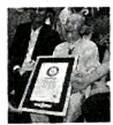题型:阅读选择 题类:常考题 难易度:普通
新目标(Go for it)版初中英语八年级上册Unit 4自主检测

Yasutaro Koide, the world's oldest man, died at the age of 113, in Nagoya, Japan on January 19, 2016. But along with his many years, Koide also left us with a piece of advice for a long and fruitful life.
Koide was born on March 13, 1903. He learned sewing and worked as a tailor(裁缝) for a men's clothes shop in most of his life. He moved to live with his daughter when he was 107 years old. When he turned 110, Koide could still read newspapers without glasses and could eat well without dentures(假牙). In August, 2015, Guinness World Records confirmed(认证) that he was the world's oldest man.
Koide always loved sitting in front of his sewing machine, enjoying making all kinds of clothes by hand. Being a tailor was his only and last job before his death.
When he was given the world record in 2015, he told reporters about his secret of living a long life, "No smoking or overdrinking! Be happy about everything. Never overdo things. Work and live with happiness.
试题篮